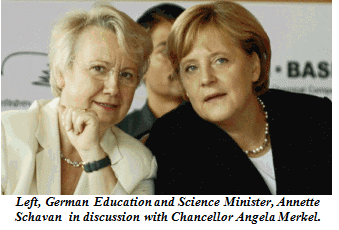|
|
|
|
|
|
|
News & Views item - October 2010 |
![]() A
Physical Chemist Shows the Way But Will Australia Follow? (October 16,
2010)
A
Physical Chemist Shows the Way But Will Australia Follow? (October 16,
2010)
 Australia
has no dearth of leaders, would-be leaders and opinion makers telling us that
the nation's economy would come to a sticky end were we to take significant
measures to reduce our exorbitant per capita greenhouse gas emissions and add
the claim that to undertaken such reduction as leader of the pack would be
unconscionable.
Australia
has no dearth of leaders, would-be leaders and opinion makers telling us that
the nation's economy would come to a sticky end were we to take significant
measures to reduce our exorbitant per capita greenhouse gas emissions and add
the claim that to undertaken such reduction as leader of the pack would be
unconscionable.
Annette Schavan, Germany's Federal Minister of Education and Research, was asked by Science to contribute this week's editorial, "Germany's Energy Research Plan". She opens with: "Last month, German Chancellor Angela Merkel approved a long-term strategy to push renewable energies as a reliable, economical, and environmentally sound pillar of sustainable economic growth".
And for those unaware, Dr Merkel did her undergraduate studies in physics at the University of Leipzig, and went on to receive her doctorate in physical chemistry from the Central Institute for Physical Chemistry of the Academy of Sciences in Berlin-Adlershof based on her thesis in quantum chemistry.
That "strategy to push renewable energies" has been simply termed the Energiekonzept (Energy Concept) and has as its starting point Germany's current base of renewable energies supplying 16% of the nation's energy needs, an amalgam of wind, hydro, biomass, geothermal, and photovoltaic power. In 2010, the German government will spend approximately €1 billion (A$1.4 billion) on energy and climate research.
According to Ms Schavan, Energiekonzept currently plans for "renewable energies [to] account for 18% of gross final energy consumption by 2020 (the goal agreed on by the European Union) and 60% by 2050," with specific regard to electrical power she states that renewables will provide 35% of gross electricity consumption in 2020 and 80% by 2050. The minister agrees that "basic research must lay the foundation for new transmission lines, large-scale storage systems, backup power stations, and information technology–driven networks to balance volatile electricity production" from wind and solar sources but assures readers that the "German government will provide the finances needed to manage the economic and societal burden of this change. The Federal Ministry of Education and Research will address the challenges and contribute to the new Energy Research Program".
However, despite its contentiousness part of the mix will require extending the lifetime of Germany's nuclear reactors by an average of 12 years but in return the government intends that "a substantial share of the future profits of nuclear energy suppliers will fund energy research and expand renewable energy sources".
Finally, the minister ends on a highly optimistic note: "I am confident that the Energiekonzept will galvanize the European Union's commitment to address climate change with long-lasting ambition."
Agreed that of all European nations Germany's economy is best placed. But then our politicians tell us that Australia's economy is one of the first world's best.
On the other hand we don't have to put up with scientists being heads of government or leaders of the opposition and we have the benefit of having the Chief Scientist buried in the bowels of the Department of Innovation, Industry, Science and Research where she is assured of exerting a minimum of influence on R&D policy.